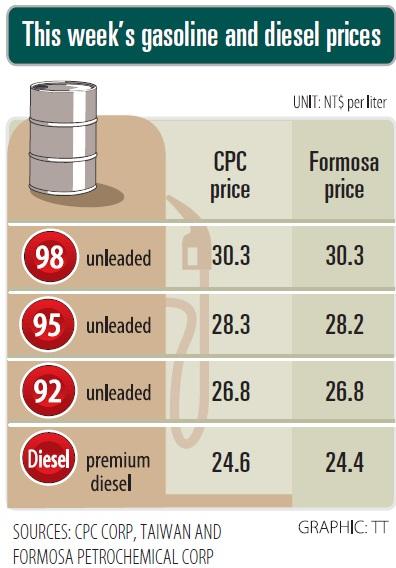Domestic gasoline and diesel prices are this week to increase by NT$0.2 per liter to reflect higher international crude oil prices, CPC Corp, Taiwan (CPC, 台灣中油) and Formosa Petrochemical Corp (台塑石化) announced separately yesterday.
The hikes mark the second consecutive week that local fuel prices have been raised.
After the adjustments, prices at CPC gas stations are to rise to NT$26.8, NT$28.3 and NT$30.3 per liter for 92, 95 and 98-octane unleaded gasoline respectively, while premium diesel is to increase to NT$24.6 per liter, the state-run refiner said in a statement.

Global crude oil prices moved higher last week amid an easing of US-China trade tensions and the planned stock market debut of Saudi Arabian Oil Co (Aramco), CPC said.
Last week, the average cost of its crude oil per barrel increased to US$62.02, from US$61.46 the previous week, the company added.
Formosa’s prices for 92, 95 and 98-octane unleaded are to increase to NT$26.8, NT$28.2 and NT$30.3 per liter respectively, with premium diesel moving up to NT$24.4 per liter, it said.
The company matched CPC’s price adjustments after factoring in the exchange rate for the New Taiwan dollar and local market competition, Formosa said.
The new prices are to take effect today, the companies said.

Taiwan’s exports soared 56 percent year-on-year to an all-time high of US$64.05 billion last month, propelled by surging global demand for artificial intelligence (AI), high-performance computing and cloud service infrastructure, the Ministry of Finance said yesterday. Department of Statistics Director-General Beatrice Tsai (蔡美娜) called the figure an unexpected upside surprise, citing a wave of technology orders from overseas customers alongside the usual year-end shopping season for technology products. Growth is likely to remain strong this month, she said, projecting a 40 percent to 45 percent expansion on an annual basis. The outperformance could prompt the Directorate-General of Budget, Accounting and

The demise of the coal industry left the US’ Appalachian region in tatters, with lost jobs, spoiled water and countless kilometers of abandoned underground mines. Now entrepreneurs are eyeing the rural region with ambitious visions to rebuild its economy by converting old mines into solar power systems and data centers that could help fuel the increasing power demands of the artificial intelligence (AI) boom. One such project is underway by a non-profit team calling itself Energy DELTA (Discovery, Education, Learning and Technology Accelerator) Lab, which is looking to develop energy sources on about 26,305 hectares of old coal land in

Netflix on Friday faced fierce criticism over its blockbuster deal to acquire Warner Bros Discovery. The streaming giant is already viewed as a pariah in some Hollywood circles, largely due to its reluctance to release content in theaters and its disruption of traditional industry practices. As Netflix emerged as the likely winning bidder for Warner Bros — the studio behind Casablanca, the Harry Potter movies and Friends — Hollywood’s elite launched an aggressive campaign against the acquisition. Titanic director James Cameron called the buyout a “disaster,” while a group of prominent producers are lobbying US Congress to oppose the deal,

Two Chinese chipmakers are attracting strong retail investor demand, buoyed by industry peer Moore Threads Technology Co’s (摩爾線程) stellar debut. The retail portion of MetaX Integrated Circuits (Shanghai) Co’s (上海沐曦) upcoming initial public offering (IPO) was 2,986 times oversubscribed on Friday, according to a filing. Meanwhile, Beijing Onmicro Electronics Co (北京昂瑞微), which makes radio frequency chips, was 2,899 times oversubscribed on Friday, its filing showed. The bids coincided with Moore Threads’ trading debut, which surged 425 percent on Friday after raising 8 billion yuan (US$1.13 billion) on bets that the company could emerge as a viable local competitor to Nvidia